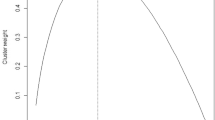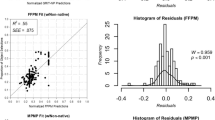Abstract
Information Integration Theory (IIT) is a theory of judgment in daily life. Its principal aim is to study the cognitive rules that people use to integrate information when they make a judgment. Traditionally, the identification of individual differences in these qualitatively different integration rules requires individual designs. It also requires the grouping of individuals according to their integration rule, which can be a challenging task, particularly when the data are noisy or when the pattern involves many factors. This paper builds on the cluster analysis tradition for developing a series of clustering procedures that can be implemented for studying, not only individual differences in integration rules, but also individual differences in other stages of information processing. These procedures are intended to simplify the identification of differences in (a) the subjective valuation of information, (b) the integration of the subjective values, and (c) general attitudes before judging.
Similar content being viewed by others
References
Anderson N.H.: Foundations of Information Integration Theory. Academic Press, New York (1981)
Anderson N.H.: Methods of Information Integration Theory. Academic Press, New York (1982)
Anderson N.H.: Contriutions to Information Integration Theory. Lawrence Erlbaum Associates, New Jersey (1991)
Anderson N.H.: A Functional Theory of Cognition. Lawrence Erlbaum Associates, New Jersey (1996)
Anderson N.H.: Empirical Direction in Design and Analysis. Lawrence Erlbaum Associates, New Jersey (2001)
Anderson N.H.: Unified Social Cognition. Psychology Press, New York (2008)
Azar F., Mullet E., Vinsonneau G.: The propensity to forgive: findings from Lebanon. J. Peace Res. 36, 169–181 (1999)
Birnbaum M.H.: New paradoxes in risky decision making. Psychol. Rev. 115, 463–501 (2008)
Bonds-Raacke J.M.: Using cluster analysis to examine husband-wife decision making. Psychol. Rec. 56, 521–550 (2006)
Brusco M.J., Cradit J.D., Steinley D., Fox G.L.: Cautionary remarks on the use of clusterwise regression. Multivar. Behav. Res. 43, 29–49 (2008)
Cuneo D.O.: Children’s judgment of numerical quantities. Cognit. Psychol. 14, 13–44 (1982)
Dougherty M.R.P., Shanteau J.: Averaging expectancies and perceptual experiences in the assessment of quality. Acta Psychol. 101, 49–67 (1999)
Farley J., Fantino E.: The symmetrical law of effect and the matching relation in choice behavior. J. Exp. Anal. Behav. 29, 37–60 (1978)
Finkelstein M.A., Brannick M.T: Making decisions about sexual intercourse: capturing college students’ policies. Basic Appl. Soc. Psychol. 19, 101–120 (1997)
Frileux S., Muñoz Sastre M.T., Antonini S., Mullet E., Sorum P.C.: Acceptability for French people of physician-assisted suicide. Death Stud. 28, 941–953 (2004)
Gamelin A., Muñoz Sastre M.T., Sorum P.C., Mullet E.: Eliciting utilities using functional methodology: people’s disutilities for the adverse outcomes of cardiopulmonary resuscitation. Qual. Life Res. 15, 429–439 (2006)
Guedj M., Muñoz Sastre M.T., Mullet E., Sorum P.C.: Do French lay people and health professionals find it acceptable to breach confidentiality to protect a patient’s wife from a sexually transmitted disease?. J. Med. Ethics 32, 414–419 (2006)
Hair J.F. Jr, Black W.C., Babin B.J., Anderson R.E.: Multivariate Data Analysis: A Global Perspective. Prentice Hall, New Jersey (2008)
Hofmans J., Theuns P.: On the linearity of predefined and self-anchoring Visual Analogue Scales. Br. J. Math. Stat. Psychol. 61, 401–413 (2008)
Hofmans J., Theuns P.: Testing the impact of predefined and self-defined end anchors on the linearity of the category rating scale. Qual. Quan. 44, 397–408 (2010)
Hofmans J., Theuns P., Mairesse O.: On the impact of the number of response categories on linearity and sensitivity of ’Self Anchoring Scales’: a functional measurement approach. Methodology 3, 160–169 (2007)
Igier V., Mullet E., Sorum P.C.: How nursing personnel judge patient’s pain. Eur. J. Pain 11, 542–550 (2007)
Louviere J.J., Islam T.: A comparison of importance weights and willingness-to-pay measures derived from choice-based conjoint, constant sum scales and best-worst scaling. J. Bus. Res. 61, 903–911 (2008)
Makris I., Mullet E.: Judging the pleasantness of contour-rhythm-pitch-timbre combinations. Am. J. Psychol. 116, 581–616 (2003)
Mas C., Albaret M.-C., Sorum P.C., Mullet E.: French general practitioners vary in their attitudes toward treating terminally-ill patients. Palliat. Med. 24, 60–67 (2009)
Mullet E., Girard M.: Developmental and cognitive points of view on forgiveness. In: McCullough, M., Pargament, K., Thorensen, C. (eds) Forgiveness: Theory, Research and Practice, pp. 111–132. Guilford, New York (2000)
Mullet E., Miroux R.: Judgment of rectangular areas in children blind from birth. Cognit. Dev. 11, 123–139 (1996)
Muñoz Sastre M.T., Mullet E.: Evolution of the intuitive mastery of the relationship between base, exponent, and number magnitude in high-school students. Math. Cognit. 4, 67–77 (1998)
Ouédraoga A., Mullet E.: Prediction of performance among West African farmers: natural and supernatural factors. Int. J. Psychol. 36, 32–41 (2001)
Rogé, B., Mullet, E.: Blame and forgiveness judgments among children adolescents and adults with autism. Autism (in press)
Schlottman A.: Children’s probability intuitions: inderstanding the expected value of complex gambles. Child Dev. 72, 103–122 (2001)
Sebestyen G.S.: Decision Making Processes in Pattern Recognition. Macmillan, New York (1962)
Shanteau J., Nagy G.F.: Probability of acceptance in dating choice. J. Pers. Soc. Psychol. 37, 522–533 (1979)
Steinley D.: K-means clustering: a half-century synthesis. Br. J. Math. Stat. Psychol. 59, 1–34 (2006)
Theuns P., Hofmans J., Verresen N.: A functional measurement inquiry on the contribution of different life domains to overall subjective well-being. Teorie Modelli. 12, 181–189 (2007)
Theuns P., Verresen N., Mairesse O., Goossens R., Michiels L., Peeters E., Wastiau M.: An experimental approach to the joint effects of relations with partner, friends and parents on happiness. Psicologica 31, 629–645 (2010)
Teisseyre N., Mullet E., Sorum P.C.: Under what conditions is euthanasia acceptable to lay people and health professionals?. Soc. Sci. Med. 60, 357–368 (2005)
Veit C.T.: Ratio and subtractive processes is psychological judgment. J. Exp. Psychol. Gen. 25, 337–353 (1978)
Wilkening F., Anderson N.H.: Comparison of two rule-assessment methodologies for studying cognitive development and knowledge structure. Psychol. Bull. 92, 215–237 (1982)
Author information
Authors and Affiliations
Corresponding author
Rights and permissions
About this article
Cite this article
Hofmans, J., Mullet, E. Towards unveiling individual differences in different stages of information processing: a clustering-based approach. Qual Quant 47, 455–464 (2013). https://doi.org/10.1007/s11135-011-9529-7
Published:
Issue Date:
DOI: https://doi.org/10.1007/s11135-011-9529-7




